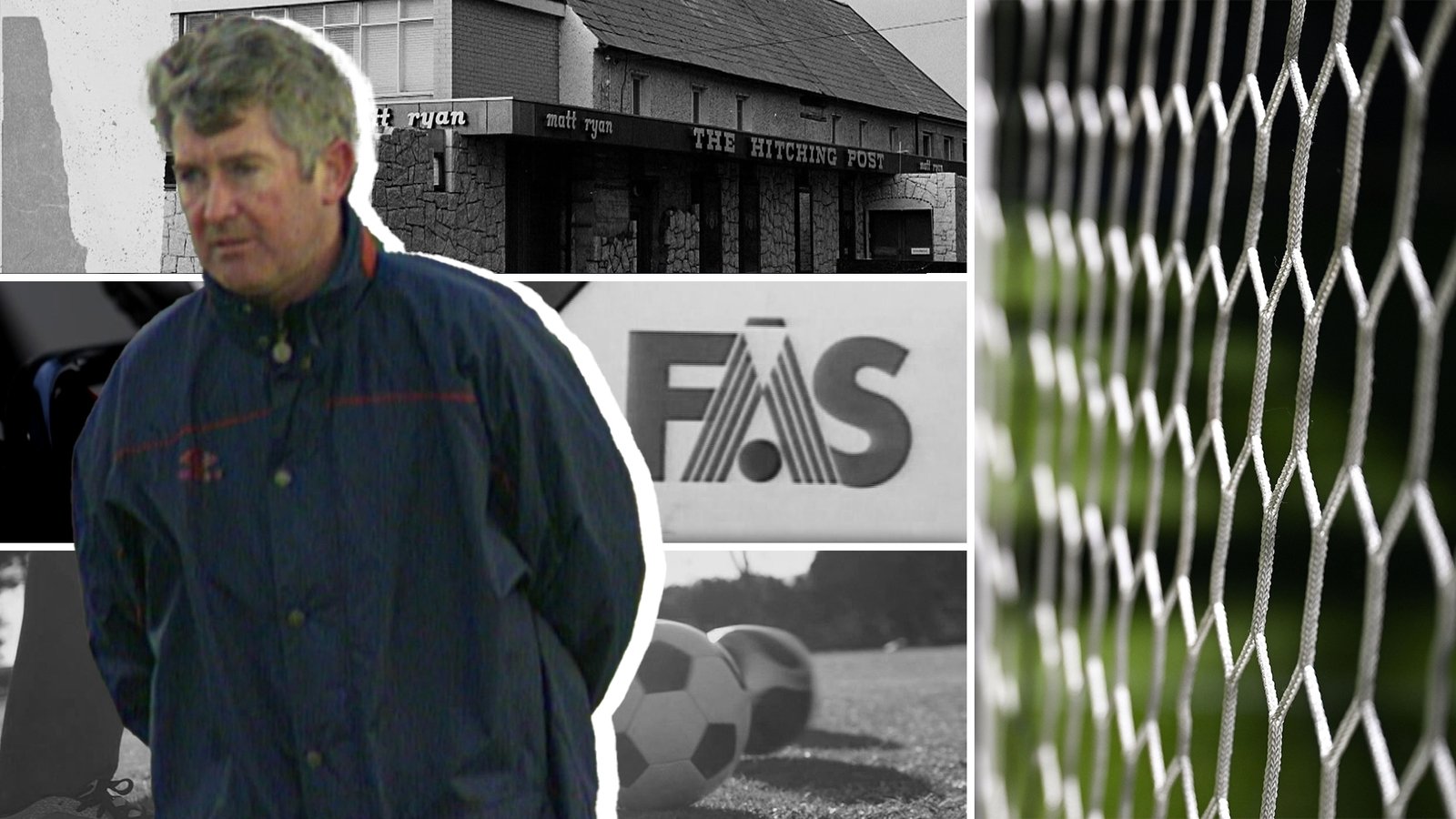By Marie Crowe and Mark Tighe
Back in 1989, the Football Association of Ireland (FAI) launched the first of several full-time soccer skills courses.
Teaming up with FÁS, the state’s training and employment agency at the time, the FAI reached out to talented, unemployed soccer players aged between 16 and 25.
Publicly funded, the nine-month course promised to develop their football skills or possibly lead to a career in coaching.
Over the following years, the men’s courses would produce several successful graduates, most famously Roy Keane.
In 1996, the first all-female course was launched. 20 young trainees aged 16 and above would travel to Leixlip in county Kildare to train daily.
All had hopes of developing a career in football.
Nearly three decades later, as part of a joint investigation between RTÉ and the Sunday Independent, several are speaking about what they experienced on the course for the first time.
Lynn Winters remembers when she decided Eamonn Collins would never touch her again. It was 27 May 1997.
She was at a function after a testimonial match for a female Irish international when Collins beckoned her over to his table.
Collins, she says, “put his hands up between my legs and practically pinched my crotch.”
“That’s what it felt like,” she says. “I remember just freezing… I stood through the conversation and I remember thinking, that’s the last time you’ll ever f**king touch me. And it was.”
Collins – then 31 – was the head coach on the course, having returned to Ireland after a ten year professional football career playing in England.
Winters, 18, was a trainee who had been made captain by Collins of the team of young women participating. The group regularly played challenge matches against outside teams during the course.
She had applied to join the course after finishing her leaving certificate.
“I thought I was the only one and that he preferred me out of everybody,” she says. “Like looking back on it, when I [recently] heard about others it’s like… I literally thought I was the only one. I had no clue.”
In the weeks after the course began, Winters started going on “dates” with Collins.
Eager to impress and develop a football career, she says she felt obliged to go on the dates to keep the captaincy.
They included trips to the cinema where she says Collins would “have his hands all over me. It was just nasty.”
“The only thing that I can say is that there was never – I never allowed myself to be in a situation where he had full control of me,” she says.
“There was lots of inappropriate touch. It’s just control… sometimes I think he still has it.”
Asked if there was intimacy, Winters – who’s gay – says there was, but she never had sexual intercourse with him, though she says that was something Collins clearly wanted.
“He would put his hands down my shorts or touch my breasts or in passing, making a joke out of it,” she says. “I touched his penis and kissed him and I… Yeah, that was it.”
Almost three decades later, she’s opening up about it for the first time.
Under the lights, and in front of the television cameras, she’s asked “did you ever feel you could say ‘no’?”
“I wasn’t that strong,” she says, “I never did say ‘no’. As in, I allowed him to touch me. I never not touched him.”
“I suppose now, looking back, it’s like ‘he’s my manager,” she said. “Will he not have me being a captain? Will I not get my game if I say no?’ So, I just went with it.”
“How did it end?” she’s asked.
“When the course ended.”
Lynn Winters, now aged in her 40s, works with vulnerable minors in a residential care setting. A mother, she says she concluded many years ago that what happened between her and her coach was wrong.
“He ruined my life,” she says. “I know it’s not my fault, but if it’ll stop him in future I’ll do what I can… He no longer controls me or what goes on in my life.”
“I’m angry at myself for not talking earlier. I’m angry at myself for not looking for supports but I’m also proud of myself that I have come to tell my story.”
She’s not alone.
Adele celebrated her 18th birthday one month into the course.
Like many of the trainees who spoke to the joint RTÉ/Sunday Independent investigation, she recalls how excited she was to join the course, but says she looks back on it with disgust and regret.
During one training session, she says Collins asked her to stay behind to gather up all the gear in the changing room.
Everyone else had gone out to the pitches when she recalls Collins came back into the room.
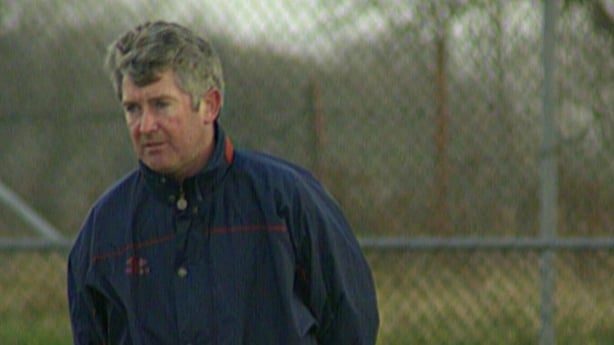
“I wasn’t even expecting him to come back in,” she said.
“He walked towards me and he started to kiss me and before I knew it, I was pinned up against the shower wall and he was kissing me.”
“He took my hand and he put it down his trousers and he was wanting me to please him, and obviously I wasn’t doing the correct job, or whatever.”
Adele says she “froze stiff” and Collins “ended up doing it himself.”
“He pulled up his pants and hit the shower button and told me to clean up the mess, and walked out of the changing room,” she says.
Over 25 years later, this unwanted sexual advance has left a lasting effect on Adele.
“I was very angry,” she says. “I still feel sick to this day. I feel annoyed. I feel let down. I feel I no longer trust anybody. I never did. Yeah, it’s been very, very tough.”
At the time she remembers thinking, “what the hell has just happened?”
This investigation put these allegations to Collins. A statement released through his solicitor said: “Eamonn Collins emphatically and unreservedly denies any improper relationship or conduct.”
Adele never told any of her friends on the course about the alleged incident. In fact, she never spoke about it at all until she was contacted by the joint investigation, and quickly guessed what the call was about.
Collins had been on her mind during the lockdowns of the pandemic, she said. Memories of him had “resurfaced” and “hit me like a ton of bricks,” she said.
She was blown away to discover that she was not the only one in her course that Collins made sexual advances towards.
“I couldn’t believe it,” she says.
“I burst into tears. I felt sick. I couldn’t believe it. I just couldn’t believe that it wasn’t just me.”
She says the effect of her encounter with Collins had a “massive” impact on her life.
Another trainee, Bridget McDonald feels similarly.
Then 21, she recalls being out drinking with Collins and two other girls from the course in Dublin city.
When the others got their trains home after a few drinks, McDonald stayed out with Collins. They went to a second pub and continued drinking. McDonald was gay and in a relationship at the time.
She remembers people in the pub looking at her and Collins. She believes her and Collins may have kissed. They ended up back in Collins’s apartment and she says that they had sexual intercourse.
Then, she says, Collins became concerned that she could be pregnant, something she says he repeatedly warned her about.
“I’d never been with a man, I’m gay and I hadn’t really got a clue. I was real naive,” says McDonald.
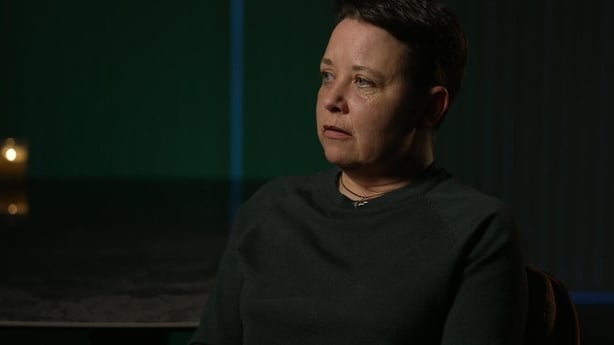
She used a phone to call her friend, a young garda living in Dublin, who she asked to collect her.
The following morning, her friend brought her to the Well Woman Centre in Liffey Street. She was referred to a doctor in Stillorgan, who gave her a prescription for the morning-after-pill. She then got a bus back home to Wexford.
Her girlfriend at the time remembers that weekend because she was worried when McDonald did not come home as normal on Friday.
When McDonald arrived back on the Saturday, she told her girlfriend about the sexual encounter with her coach. She felt guilty about it.
The following week, Trisha Bourke, a fellow trainee, remembers McDonald telling her what had happened with Collins. “She was still in shock,” says Bourke.
“She was numb, she was upset. She was blaming herself. She had been a virgin. She wasn’t into men. So it completely, completely, threw her altogether. Like, she didn’t know what to do, what to say, or who to say anything to.”
Bourke says a change came over McDonald.
“She kind of drew into herself a bit, and then she started to drink more,” she says. “But he [Collins] acted as if nothing had happened.”
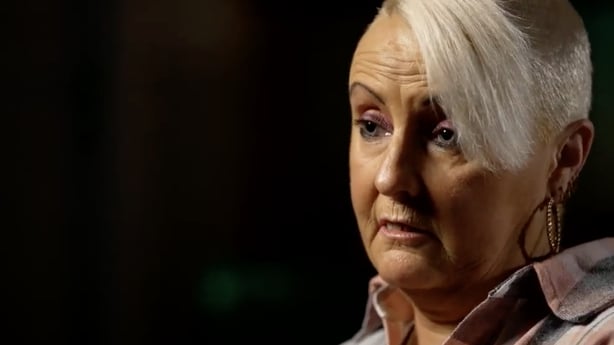
McDonald says there was no other incident between her and Collins but what happened had a profound effect on her.
“It just ruined everything,” she says. “I’ve always had low self-esteem, no confidence, I hated myself, all that kind of stuff. And soccer was the only thing that I was good at. To me it was the only thing I had and after that it just destroyed me.”
“I blamed myself for everything… I would’ve started drinking heavily after that and I struggled for years with addiction.”
“I was in my first AA meeting within a year of leaving the course – a year and a half maybe,” she says, “and I’ve struggled with that for years.”
“I’ve been in three rehabs and I don’t know if I have ever spoken about that [night]. Because I blame myself.”
The drunken encounter with Collins was the first and only sexual intercourse she has had with a man.
Eamonn Collins now works as a football agent. He has been licensed by both the FAI and the FA in England.
On 15 March, after Football Association of Ireland (FAI) officials met a group of the women who had attended the Leixlip course, a “stand down” order was issued which prohibits him from any involvement in Irish football while the FAI carries out its own investigations. This is standard process when a complaint is made pending an investigation being carried out.
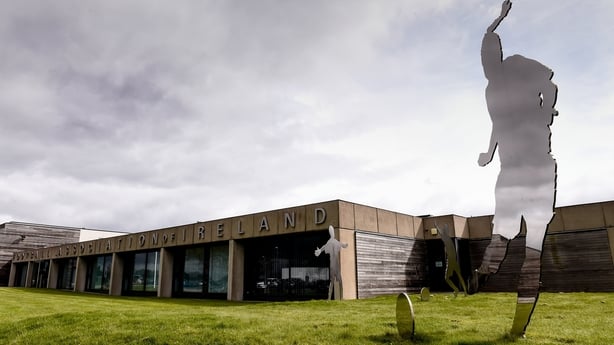
RTÉ Investigates and the Sunday Independent asked Collins for his response to the allegations made by several woman during the joint investigation.
In a written statement issued by his solicitors, Collins said he “emphatically and unreservedly denies any improper relationship or conduct by him while he was involved as a coach on a football training course in west county Dublin that commenced in 1996 which is more than 25 years ago.”
“Mr Collins has been involved actively in football as a player; coach and agent over 40 years,” the statement said.
“He has never been the subject of any investigation or allegation of improper conduct. He has taken legal advice in relation to the defamatory comments made and will take such steps as are necessary to protect his reputation.”
Some of the comments and statements made are false, untrue, malicious and damaging to Mr Collins.”
The statement said Collins will not make any further public comments and the matter will be dealt with by his solicitors.
Last week, the FAI announced it was introducing a new anonymous reporting mechanism to allow players and others to flag concerns and report inappropriate behaviour to Raiseaconcern, an independent complaint handling firm.
Four days before the announcement, reporters from RTÉ and the Sunday Independent contacted the FAI seeking an official response to concerns raised by the women.
In a statement, the FAI said it was “shocked and appalled to learn of disturbing allegations of abuse brought forward by women in involved in Irish football in the 1990s.”
The FAI said it had met with some of the women to listen to and acknowledge their experiences, while also offering support.
Read more: Female players say ‘our eyes have been opened’ in new statement
It said it has contacted An Garda Síochána and Tusla about the cases, in accordance with mandatory reporting requirements and its own safeguarding and child welfare regulations.
“The Association acknowledges the enormous courage of the women in coming forward and making their concerns known and would encourage anyone involved in Irish football to report any concern that may arise,” it said.
“The Association believes unequivocally that everyone involved in Irish football should at all times feel that they are in a safe environment and that appropriate safeguarding and reporting processes are in place and operating effectively.”
The Professional Footballers Association of Ireland (PFAI) has been providing support to the women over the last six months.
The FAI has asked that anyone who experienced harm or abuse from Irish football to contact an independent contractor it has hired to take statements from complainants.
FÁS was dissolved after a series of controversies on corporate governance. It was replaced by Solas in 2013.
Although the course was funded by a State organisation, Solas told the joint investigation that it “does not hold any records” from the FÁS course, or any related safeguarding policies.

